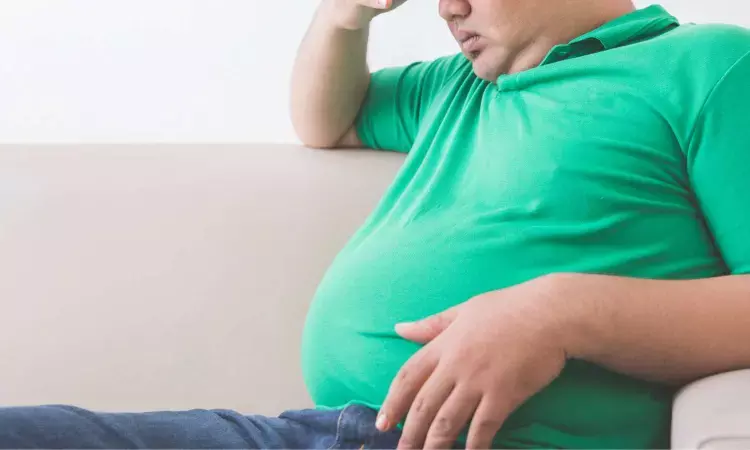- Home
- Medical news & Guidelines
- Anesthesiology
- Cardiology and CTVS
- Critical Care
- Dentistry
- Dermatology
- Diabetes and Endocrinology
- ENT
- Gastroenterology
- Medicine
- Nephrology
- Neurology
- Obstretics-Gynaecology
- Oncology
- Ophthalmology
- Orthopaedics
- Pediatrics-Neonatology
- Psychiatry
- Pulmonology
- Radiology
- Surgery
- Urology
- Laboratory Medicine
- Diet
- Nursing
- Paramedical
- Physiotherapy
- Health news
- Fact Check
- Bone Health Fact Check
- Brain Health Fact Check
- Cancer Related Fact Check
- Child Care Fact Check
- Dental and oral health fact check
- Diabetes and metabolic health fact check
- Diet and Nutrition Fact Check
- Eye and ENT Care Fact Check
- Fitness fact check
- Gut health fact check
- Heart health fact check
- Kidney health fact check
- Medical education fact check
- Men's health fact check
- Respiratory fact check
- Skin and hair care fact check
- Vaccine and Immunization fact check
- Women's health fact check
- AYUSH
- State News
- Andaman and Nicobar Islands
- Andhra Pradesh
- Arunachal Pradesh
- Assam
- Bihar
- Chandigarh
- Chattisgarh
- Dadra and Nagar Haveli
- Daman and Diu
- Delhi
- Goa
- Gujarat
- Haryana
- Himachal Pradesh
- Jammu & Kashmir
- Jharkhand
- Karnataka
- Kerala
- Ladakh
- Lakshadweep
- Madhya Pradesh
- Maharashtra
- Manipur
- Meghalaya
- Mizoram
- Nagaland
- Odisha
- Puducherry
- Punjab
- Rajasthan
- Sikkim
- Tamil Nadu
- Telangana
- Tripura
- Uttar Pradesh
- Uttrakhand
- West Bengal
- Medical Education
- Industry
Improvement of social ties and alleviation of loneliness may Significantly Lower Mortality Risk in Individuals with Obesity

In a groundbreaking study utilizing data from the UK Biobank, researchers have unearthed a powerful link between social connections, obesity, and mortality risk. The cohort study, spanning from March 2006 to November 2021 and including nearly 400,000 participants without cancer or cardiovascular disease, sheds light on the profound impact of social isolation and loneliness on the health outcomes of individuals grappling with obesity. The study found that obese people who are isolated less have decreased all-cause mortality risk.
The study findings were published in the journal JAMA Network Open.
People with obesity often face significantly elevated levels of social isolation and loneliness compared to their non-obese counterparts. However, there is limited understanding of whether addressing and improving social isolation or loneliness could potentially reduce the heightened risk of mortality associated with obesity. Hence, researchers conducted a cohort study to investigate whether improvement of social isolation or loneliness is associated with lower obesity-related excess risk of mortality. Using data from the UK biobank, researchers measured the all-cause, cancer-related, and CVD-related mortality as the primary outcome.
Findings:
- The study reveals a striking inverse relationship between social connections and mortality risk among those with obesity.
- Individuals with obesity and a minimal social isolation index of 0 demonstrated a significantly lower hazard ratio (HR) for all-cause mortality compared to their counterparts with an index of 2 or greater.
- As the index of social isolation decreased, indicating stronger social ties, the protective effect against mortality became increasingly evident. This trend was statistically significant (P for trend < .001), emphasizing the importance of social connections in the face of obesity-related health challenges.
- Similarly, loneliness emerged as a crucial factor influencing mortality risk in individuals with obesity.
- Those with obesity and a loneliness index of 0 exhibited a lower HR for all-cause mortality compared to those with an index of 2.
- The HR continued to decrease as the loneliness index diminished, signifying a tangible protective effect against mortality (P for trend < .001).
- Perhaps most noteworthy is the revelation that social isolation outranked loneliness, depression, anxiety, and lifestyle-related risk factors such as alcohol consumption, physical activity, and diet in estimating the risks of all-cause mortality, cancer-related mortality, and cardiovascular disease-related mortality.
- The comprehensive findings demonstrate that as the index of social isolation and loneliness dropped, individuals with obesity experienced a remarkable 36% and 9% decrease in the HR for all-cause mortality, respectively, compared to those without obesity.
The study underscores the critical role of social connections in mitigating the impact of obesity on mortality. Beyond conventional risk factors, addressing social isolation and loneliness emerges as a pivotal aspect of holistic health strategies. The findings pave the way for novel interventions focused on enhancing social support networks for individuals grappling with obesity.
In conclusion, this cohort study establishes a compelling association between social connections, obesity, and mortality risk. The potential for interventions to improve social ties and alleviate loneliness offers a beacon of hope for enhancing the well-being and longevity of individuals navigating the complexities of obesity. This research not only informs future healthcare strategies but also underscores the profound impact of social connections on overall health outcomes.
Further reading: Zhou J, Tang R, Wang X, Li X, Heianza Y, Qi L. Improvement of Social Isolation and Loneliness and Excess Mortality Risk in People With Obesity. JAMA Netw Open. 2024;7(1):e2352824. doi:10.1001/jamanetworkopen.2023.52824
BDS, MDS
Dr.Niharika Harsha B (BDS,MDS) completed her BDS from Govt Dental College, Hyderabad and MDS from Dr.NTR University of health sciences(Now Kaloji Rao University). She has 4 years of private dental practice and worked for 2 years as Consultant Oral Radiologist at a Dental Imaging Centre in Hyderabad. She worked as Research Assistant and scientific writer in the development of Oral Anti cancer screening device with her seniors. She has a deep intriguing wish in writing highly engaging, captivating and informative medical content for a wider audience. She can be contacted at editorial@medicaldialogues.in.
Dr Kamal Kant Kohli-MBBS, DTCD- a chest specialist with more than 30 years of practice and a flair for writing clinical articles, Dr Kamal Kant Kohli joined Medical Dialogues as a Chief Editor of Medical News. Besides writing articles, as an editor, he proofreads and verifies all the medical content published on Medical Dialogues including those coming from journals, studies,medical conferences,guidelines etc. Email: drkohli@medicaldialogues.in. Contact no. 011-43720751




